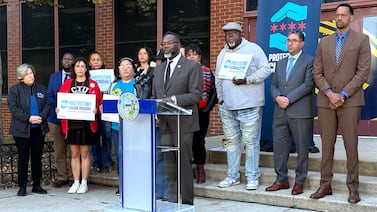A bill that would have significantly changed how Colorado charter schools operate, making it simpler for local districts to close them, was defeated by state lawmakers Thursday in its first hearing.
After hours of testimony in the House Education Committee, the bill failed on a 3-8 vote.
Several Democratic lawmakers joined Republicans to defeat the bill, although some Democrats said they supported parts of the bill and would welcome a rewrite.
Students, teachers, parents, many charter school leaders, and some advocates testified against the bill for several hours.
A couple of charter leaders said their schools would not be open if it wasn’t for the current second appeals process that meant the State Board of Education had final say in allowing their school to open despite a local district’s opposition.
“Here I am eight years later with a vibrant school,” said Natalia Miller-Forrest, leader of Heritage Heights Academy in Centennial. “Honestly, I think this bill is an attack on charter schools. There’s not a part of this bill that I can get behind.”
Far fewer people spoke in support of the bill.
Rep. Lorena García, one of the bill sponsors, accused opponents of “fear mongering” by telling parents and others that the bill would cause charter schools to close. García said she encountered a mom who was going to testify against the bill because doing so would fulfill her school’s parental engagement requirement. All the mom had been told was that the bill would close her child’s charter school, García said.
When García told her more about the bill, she said the mom told her that the bill was needed and that her own child’s special education plan wasn’t being followed. But García said the mom told her she was afraid to change her testimony, or of being named in Garcia’s recounting of the conversation, because she feared retaliation for her child.
“Yes, there are great charters,” García said. “No, not all are great. The great charters that are in it for our kids will prevail.”
The bill, had it been approved, would have made a number of changes, including prohibiting charter schools from getting any of their waivers automatically. It would have allowed districts with declining enrollment to create moratoriums to prevent new charter schools from opening, and it would have allowed districts to keep a larger share of charters’ per-student funding.
Districts would also have had final say in charter school appeals, preventing the State Board of Education from being able to override local decisions. Supporters who testified in favor of the bill included teachers, parents, former students, teachers union leaders, and a lawyer and a school board member for the Adams 14 school district.
Sponsors of the bill said the proposal was meant to put charter schools on a “level playing field” with traditional district-run schools, and that the goal was accountability and transparency for families.
Rep. Tammy Story, one of the sponsors and a member of the education committee, questioned charter school leaders who testified about why the bill would harm them.
Story suggested that the bill was not meant to be a threat to charter schools that were operating good programs. She said the proposed rules about conflicts of interest and preventing personal financial gain, for example, were aimed at bad actors who probably wouldn’t show up to testify.
Some who testified against the bill said that the problems identified by sponsors weren’t unique to charter schools.
Rep. Ron Weinberg, a Republican who was filling in on the committee and voted against the bill, said that if the true intent was not to harm schools that could be doing good work, the bill should have been written in coordination with the leaders of those schools.
Yesenia Robles is a reporter for Chalkbeat Colorado covering K-12 school districts and multilingual education. Contact Yesenia at yrobles@chalkbeat.org.






